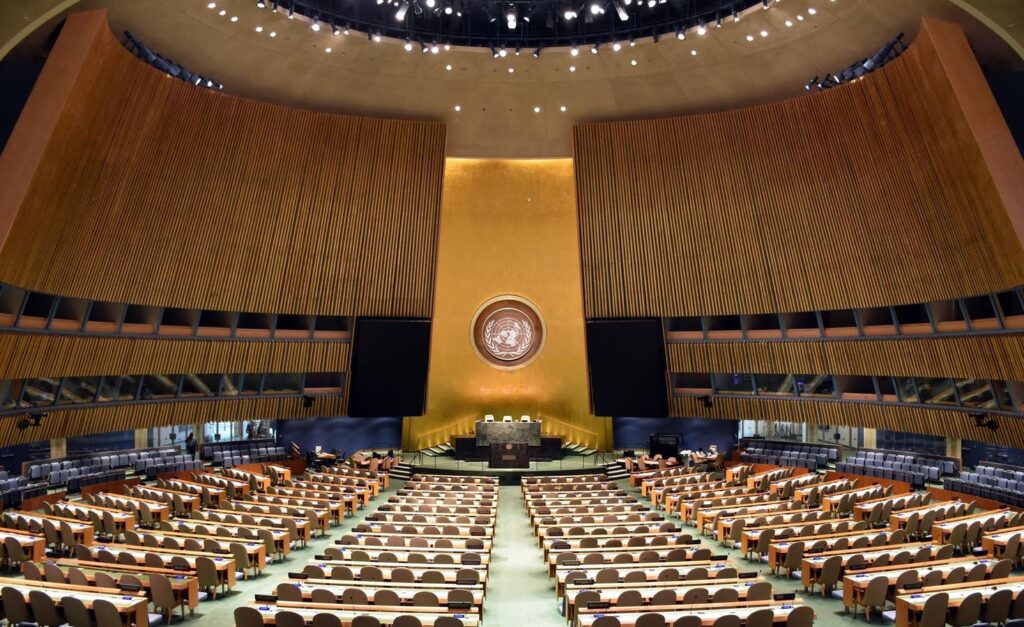The meeting room inside the United Nations headquarters as seen in September 2015 in New York, … [+]
On November 22, 2024, the United Nations Sixth Committee adopted a resolution to advance the draft treaty on crimes against humanity to negotiations. The resolution called for a concrete process consisting of preparatory sessions in 2026 and 2027, and three-week negotiations in 2028 and 2029, where a treaty will be finalized. The treaty on crimes against humanity is to codify crimes against humanity and to impose clear duties upon states to prevent and punish the crime. Currently, such obligations in relation to crimes against humanity do not exist in international law, while there are international treaties focused on other international crimes, and in particular, crimes of genocide, torture, apartheid and forced disappearances.
As the resolution was being put forward, Gambia’s delegate emphasized that a future convention would serve as a tool for accountability and close the gap to impunity. He added, “We dare to lead a way forward, and we are grateful to all delegations that shared this daring journey of hope for a better world — a world without crimes against humanity and a world where voices of victims are heard louder than their perpetrators. It has been a journey of pain and perseverance, but worthy of the fight endured.” The observer for the State of Palestine noted that “This resolution carries monumental moral, legal, diplomatic and political significance for generations to come.” The representative of Jordan indicated that this is a “milestone in the work of the Committee, and will make a huge difference in our common efforts to fight impunity and bring the perpetrators of the crimes against humanity to justice.” Mexico’s representative emphasized that the resolution sets the Committee on the right path towards a formal negotiation process, voicing hope for a smooth, inclusive and transparent process toward the adoption of a UN convention to prevent and punish crimes against humanity.
The resolution was an important step towards ensuring that the treaty on crimes against humanity becomes a reality. As it stands, crimes against humanity are codified in the Rome Statute to the International Criminal Court as crimes such as murder, extermination, enslavement, deportation or forcible transfer of population, torture, rape, sexual slavery, and many more, when committed as part of a widespread or systematic attack directed against any civilian population, with knowledge of the attack. Crimes against humanity do not need to be linked to an armed conflict and can also occur in peacetime. Over the last decade, the International Law Commission (ILC), the UN entity tasked with the development and codification of international law, and the UN General Assembly have made progress toward establishing a convention on crimes against humanity. In 2019, the ILC published its Draft Articles on Prevention and Punishment of Crimes against Humanity and recommended them to the UN General Assembly. Since 2023, the Sixth Committee of the UN General Assembly has been holding debates, ultimately leading to the agreement to formally start negotiations.
The draft articles, which are to become the basis for the international treaty, incorporate, among others, important obligations to prevent crimes against humanity. Under the draft Article 4 on the obligation of prevention, “each State undertakes to prevent crimes against humanity, in conformity with international law, through: (a) effective legislative, administrative, judicial or other appropriate preventive measures in any territory under its jurisdiction; and (b) cooperation with other States, relevant intergovernmental organizations, and, as appropriate, other organizations.” Currently, such obligations in relation to crimes against humanity do not exist in international law, while there are international treaties focused on other international crimes, and in particular, crimes of genocide, torture, apartheid and forced disappearances.
The future treaty on crimes against humanity will add legal force to the prevention and punishment of crimes against humanity. Prevention and punishment of these crimes are more needed now than ever before.


